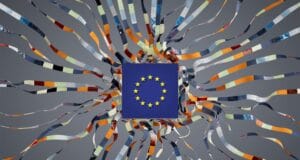This content was created by the Data Sharing Coalition, one of the founding partners of the CoE-DSC.
Digitalisation is defining a new era for the mobility sector. It offers exciting new opportunities to improve efficiency and sustainability, but also challenges, relating to access to data, lack of trust and the winner-takes-all tendency in two-sided markets. To unleash the potential of digitalisation for mobility, further development of Mobility as a Service (MaaS) is key. MaaS is the integration of various forms of transport services into a single mobility service that is accessible on demand. A user plans, books and pays a trip using a single app. However, to create this joint and seamless customer journey, data sharing and cooperation between many parties is needed. The MaaS-Lab, initiated by the Royal Dutch Transport Federation (KNV), is a collaboration between several parties involved in the development of MaaS in the Netherlands. During the upcoming Community Meeting on October 29, Sonila Metushi, Policy Advisor at (KNV) and managing the MaaS-Lab initiative, will provide more insight into how MaaS-Lab is working towards a common set of agreements for data sharing. We spoke with her in advance.
COVID-19 as the accelerator for MaaS
“Although one could say that the urge for improving mobility – and so on MaaS – is not a main priority, the opposite is true”, says Metushi. “The COVID-19 pandemic is clearly an accelerator for improving mobility and Mobility as a Service in particular. This is a game changing moment to make sure that we do not go back to the ‘old normal’ with all those different silos of transport. It is the perfect time to shape the future of mobility. We can now embrace the opportunities that digitalisation brings and create a new normal with more efficiency for businesses, but more importantly the very much needed flexibility for the user.”
According to Metushi this level of flexibility is an entirely new experience for users. “Compared to other countries in Europe, the Netherlands is uniquely placed and positioned when it comes to easiness of travel. Take, for instance, the ‘OV chip card’ that enables consumers to only use one payment method for using public transport. We need to recognise that and can be proud of that from a Dutch perspective. However, when traveling from A to B, there is more than trains or buses to reach a destination. With Mobility as a Service, a consumer can plan, book and pay his or her entire journey in one app, irrespective of the travel mode chosen: public transport, sharing a bike or car or taking a taxi are all covered. The way we travel can be fully based on personal preferences, without any boundaries. It’s all about easiness and freedom of choice for the user.”
MaaS-Lab: creating a common set of agreements for data sharing and cooperation
In order to create the enabling conditions for the development of MaaS in The Netherlands the Royal Dutch Transport Federation (KNV) initiated MaaS-Lab. Metushi: “The MaaS-Lab is an initiative that, at this moment, brings together 28 market players that are active in developing the MaaS ecosystem. It’s an interesting mix of transport operators, MaaS-providers and technology companies. As a trusted voice of businesses driving the development of MaaS in the Netherlands our main goal is to facilitate the co-creation of an open and inclusive ecosystem where businesses can thrive and users can travel seamlessly from A to B. To enable a joint customer journey, cooperation between all parties involved is key. By doing that, we prevent the creation of a winner-takes-all scenario where all power rests with one party. To prevent such an ‘ego system’ and create this open and inclusive ecosystem instead, the MaaS-Lab wants to come to a common set of minimum agreements for data sharing and cooperation (‘MaaS-Afsprakenstelsel’).”
MaaS-Lab does not want to reinvent the wheel, Metushi explains: “For example, we are in close contact with the Dutch Ministry of Infrastructure and Water Management, that together with the regional authorities are investing 20 million euros in pilot projects focusing on travellers in which several MaaS apps are being developed. Building upon existing initiatives such as TOMP API and OpenBike is key. Besides, we want to learn from other sectors that have dealt with similar questions before. Take for example the banking sector with iDeal or the healthcare sector with MedMij. This is also the main reason for us to join the Data Sharing Coalition, which brings together all these organisations that are deeply involved in similar initiatives as ours and are eager to share their knowledge. We want to repeat the successes from other sectors and avoid the same mistakes. Although learning and sharing knowledge is our main goal, in the long term we would love to explore cross-sectoral use cases together with other participants from the Data Sharing Coalition. Mobility is at the very heart of cross-sectoral cooperation. We travel to go to work to go on vacation or to visit our parents. Collaboration with other sectors is in our DNA. With regards to charging, it would be interesting to collaborate with the energy sector. Alternatively, collaborating with the insurance sector (including insurance as part of travelling) could eventually lower the costs for businesses. In the end, finding potential incentives for the end user is key in discovering cross-sectoral opportunities”
To enable a joint customer journey, cooperation between all parties involved is key. By doing that, we prevent the creation of a winner-takes-all scenario where all power rests with one party.
Working towards a public-private cooperation
To take the next step in coming to a common system of agreements for MaaS, in June this year, seven parties that are involved in the MaaS-Lab formed a ‘Coalition of the Willing’. “With this smaller group of organisations, all “willing” and “able” to make MaaS happen, we looked into the scope of a potential framework of cooperation,” Metushi says. “Together, we looked into relevant business, operational and technical topics that we can agree on as a minimum to actually enable all these transport operators, MaaS-providers and technology companies to collaborate. By agreeing on the minimum, businesses can increase efficiency and reduce costs, with the user benefitting from the seamless travel with maximum freedom and flexibility. Finally, as a next step, we are working towards a public-private cooperation that more thoroughly looks into the governance of this ecosystem and the priorities in terms of topics. Although a lot is possible from a technical or functional perspective, we’ve already learned that sharing data only happens when parties involved trust each other. Sound governance is needed to ensure that the set of agreements that will be determined are also met.”
On October 27th, MaaS-Lab will give a presentation during the Community Meeting in which it will elaborate on their efforts to come to a common set of agreements for data sharing and cooperation. Do you want to attend? Please send us an email: [email protected]




